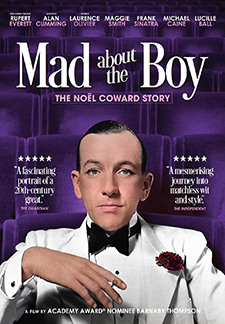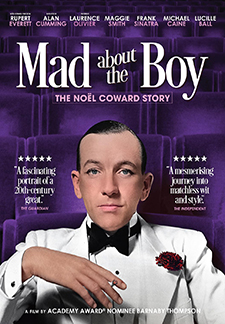Mad About the Boy: The Noël Coward Story (DVD Review)

Director
Barnaby ThompsonRelease Date(s)
2023 (November 19, 2024)Studio(s)
Fragile Films/Unigram (Greenwich Entertainment/Kino Lorber)- Film/Program Grade: A
- Video Grade: B-
- Audio Grade: A-
- Extras Grade: D
Review
Noël Coward is known these days mostly for his hit plays and witty patter songs. Mad About the Boy: The Noël Coward Story explores the man in detail—his working-class childhood in London, theatrical career, service to British Intelligence during World War II, stint as a Las Vegas sensation, private life as a closeted homosexual, and much more.
The documentary includes archival photos, TV interviews, film clips, Coward’s home movies, interviews, and a soundtrack drawn from his best-known songs. Narrator Alan Cumming introduces clips and ties together phases of Coward’s life, but the best insights into Coward come from his own words, which reflect his quick wit and self-deprecation. Some of his responses are tellingly brief. Asked what constitutes success, he replies, “Box office.” Queried about why he left England to live in Jamaica, he sums up his reason in two words—“Income tax.” With the British government’s 90% marginal tax rate at the time, it made financial sense for him to set up residence in the warmer climate of Jamaica.
Actor Rupert Everett occasionally voices Coward to read some of his writings, and a veritable who’s who of celebrities offer their takes on the writer/actor/director/sophisticate. Among them are actors Laurence Olivier, Maggie Smith, David Niven, and Lynn Redgrave, and playwrights Harold Pinter and John Osborne.
Referring to himself as “extremely lovable,” Coward speaks about the close relationship he had with his mother. One of the reasons he longed for success in show business was so that he could make his mother’s life easier. His first foray into New York wasn’t successful. American audiences didn’t take to his sophisticated drawing room comedies of upper-class types. He was highly impressed by the acting style in American theater, which was faster and livelier than in British plays.
Coward’s image as the talented bon vivant playboy arose with the success of his play The Vortex and soon “he was everywhere all at once.” By the age of 30, he had become the highest-paid playwright in the world. A financier he met, Jack Wilson, became his business manager and secret lover. With homosexuality illegal in England, it was necessary for Coward to live a guarded life.
Coward had no formal musical education, yet penned many songs that became standards, among them A Room With a View, Poor Little Rich Girl, Sail Away, London Pride, I’ll Follow My Secret Heart, World Weary, I’ll See You Again, and Mad About the Boy. Among his rapid patter songs heard in the documentary are Poor Uncle Harry, Mrs. Worthington, and Mad Dogs and Englishmen, the last performed by Coward in a TV special.
After World War II, Coward entered a low period with a series of theatrical failures. He developed a cabaret act composed of his songs and witty banter for the Cafe de Paris. Las Vegas beckoned and Coward, lured by the big bucks, became hugely successful. With his career revived and his star shining once again, CBS offered him a lucrative deal to direct three TV specials. A neighbor of his in Jamaica, Ian Fleming, offered him the title role of the villain in the film adaptation of Dr. No, but Coward responded in a telegram, “No, no, no. A thousand times no.”
The documentary does a fine job of covering the high points of Coward’s life. The most surprising to me was the clandestine role he played for the British Secret Service during World War II. Using his image as the carefree sophisticate and wit to travel the world freely, he mixed with all sorts of foreign dignitaries and reported any information that might help the British war effort. He took heat from the public, who believed he was enjoying a playboy’s life while his country was in peril. The secret nature of his mission meant that he couldn’t defend himself.
Mad About the Boy: The Noël Coward Story was edited by Ben Hilton using material from numerous sources, so the quality of the sound and picture varies. film clips and archival interviews look best, sharp and well detailed. TV kinescopes are far from today’s hi-def images but invaluable for their historical significance. Archival photographs illustrate Coward’s childhood years, his early acting roles, and individuals important in his life, including Jack Wilson, lifelong friend Gertrude Lawrence, and final lover Graham Payn. Images are in both black & white and color. The pace is brisk, zipping past Coward’s failures.
There are two soundtrack options: English 5.1 and 2.0 Dolby Digital. English SDH subtitles are an available option. Throughout the documentary, songs by Noël Coward are played to more or less coincide with the period covered. The songs—some performed by Coward himself—add atmosphere to what otherwise might have been a dry presentation. Alan Cumming’s narration, free of editorializing, is unobtrusive and used sparingly to set the time frame. Famous personalities who show up include Lucille Ball, Lauren Bacall, Frank Sinatra, and Michael Caine. Sound quality, of course, depends on the source material, but there’s no problem understanding clearly any of the interviews or clips.
The only bonus materials on the DVD release from Greenwich Entertainment via Kino Lorber include the following:
- Trailer (1:57)
- Coup! Trailer (2:15)
- Close to You Trailer (1:54)
- Food and Country Trailer (2:25)
- Happy Clothes: A Film About Patricia Field Trailer (2:12)
Director Barnaby Thompson has provided a comprehensive and entertaining documentary in Mad About the Boy: The Noël Coward Story. It’s the story of a man who was a dominant force in 20th century show business. Not only a talented playwright, he was also a song writer, director, TV star, Las Vegas entertainer, raconteur, and an international character who happily assumed the role of cosmopolitan wit. In addition, the film presents the ups and downs of show business and how perseverance can lead to unforeseen rewards.
- Dennis Seuling

